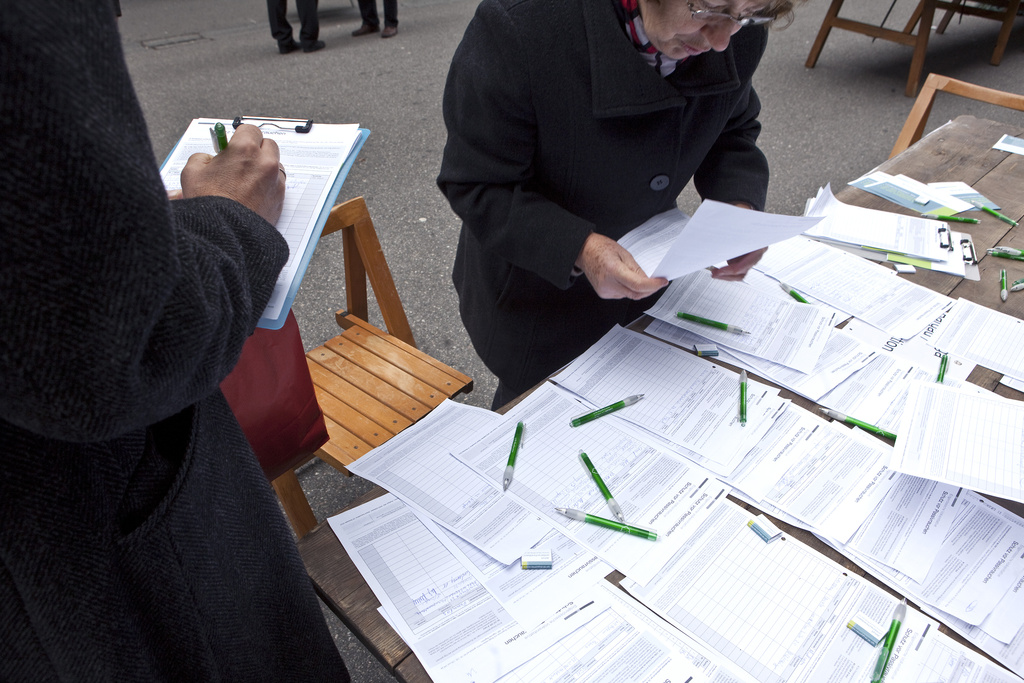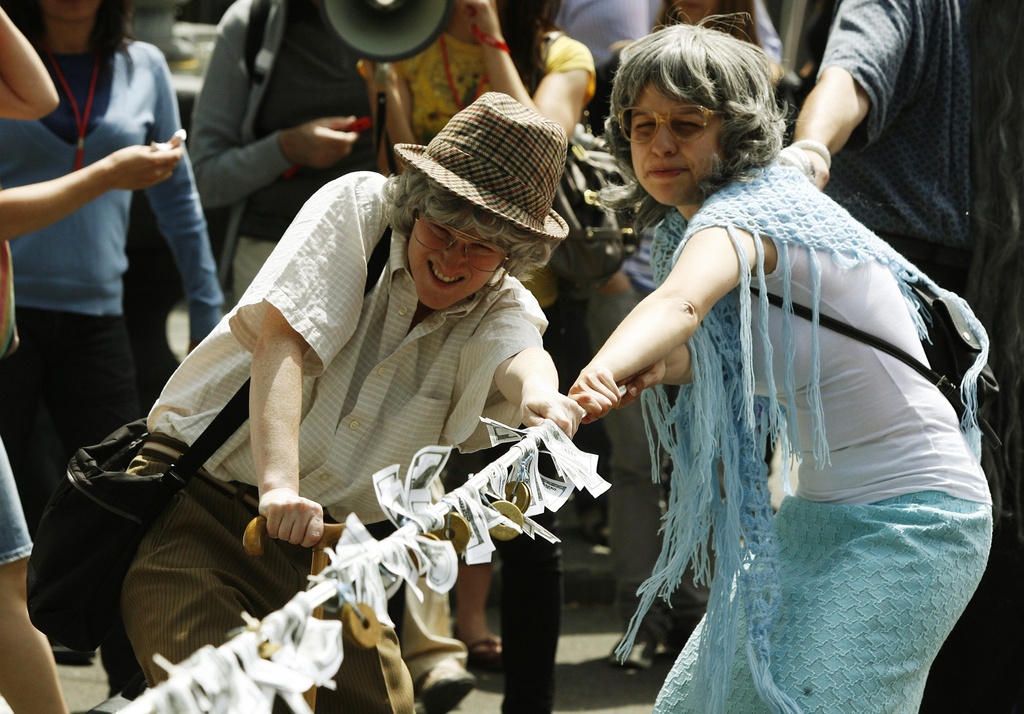The Swiss vote more than any other country

Swiss citizens have more chances to express their opinions at the ballot box than anyone else in the world, thanks to their extensive system of direct democracy.
In most democracies, citizens only turn out to vote for elections – presidential, parliamentary or local. It is the representatives they choose on these occasions who take political decisions on their behalf. That’s indirect democracy.
In an indirect democracy it is unusual for citizens to be asked to vote on specific issues. One exception in Europe in recent years has been the decision by a few countries to give citizens a say on European integration.
Things are quite different in Switzerland. Parliamentary elections are only held every four years, but the Swiss get the chance to vote on particular issues three or four times a year.
Some of the issues they are asked to decide on are at federal level: voters all over the country vote on the same thing. But in addition, they are usually asked to vote on issues relevant to their own canton and even their own commune as well.
Recent cantonal votes have included banning smoking in restaurants, or bringing the particular cantonal school system into line with a proposed single nationwide system. At communal level votes may be held on such things as funding a new museum, or extending a local bus route.
Unique rights
Although some other countries or regions of the world also have direct democracy, none use it in exactly the same way as the Swiss.
Swiss citizens can propose legislation of their own, by putting forward what is known as an initiative, or they can thwart legislation already approved by parliament, by calling a referendum.
Political or social groups often submit issues to the people which would be unlikely to find a parliamentary majority. Often it is leftwing groups which call votes on social and economic issues, while the rightwing tends to submit ideas on national identity and foreigners.
Criticism
The Swiss are proud of their system of direct democracy, but this does not stop some of them finding fault with some of its aspects. One frequent criticism is that there are too many votes, and that they are too complicated. Turnout varies widely, depending on the issue, but generally hovers around only 40 per cent.
But more seriously, some people ask whether it is right for citizens to have the chance to vote on every issue, some of which are very complex, and where passions may be involved.
In a controversial vote last November, for example, two-thirds of voters came out in favour of a change to the constitution by approving an initiative to ban the construction of minarets in Switzerland.
Gregor Rutz, the vice-president of the Zurich cantonal section of the rightwing Swiss People’s Party, does not think this is a problem.
“I am convinced that it is possible to explain complex matters simply,” he told swissinfo.ch.
“Direct democracy enables lots of interest groups to speak out, and out of this variety of opinions voters can select the one which they think is plausible.” This ensures that no-one can make false claims which go unopposed, he said.
But this has not stopped the anti-minaret initiative, for example, from running into trouble. A number of appeals have been submitted to the European Court of Human Rights in Strasbourg, claiming that the ban violates the human rights of Muslims in Switzerland.
Among the issues the minaret vote raised was the question of the legality of a popular initiative. The Swiss government was strongly against the ban, but it can only prevent voting on an initiative if it violates “peremptory norms”, in other words norms which are obligatory under international law – such things as the prohibition of crimes against humanity, genocide, slavery and torture. In the case of the minaret initiative its hands were tied.
Political scientist Andreas Gross, a member of the centre-left Social Democratic party in the Swiss House of Representatives, says the fallout from the minaret vote will contribute to a rethink.
“The fact we now have some problems with direct democracy will increase the readiness to modify it.
“The Swiss have learned now that there is a problem and you can’t vote on basic human rights,” he told swissinfo.ch.
Promoting discussion
Whatever lessons may or may not be learned from the minaret vote, it is generally agreed that a major bonus of the Swiss system is that it enables issues to be discussed that might otherwise be ignored.
Thanks to an initiative some 20 years ago, the Swiss had the chance to debate whether the army should be abolished – not a subject ever likely to have been brought up in parliament.
More recently, in 2003, an initiative calling for better rights for the disabled was rejected, but some of its proposals were incorporated into legislation which came into force in 2004.
Many commentators see another important advantage of the direct democracy system as helping to sustain the delicate balance between the different groups in Swiss society.
Switzerland prides itself on its talent for compromise. Both government and parliament are forced to look for the broadest possible consensus when framing new legislation, in order to avoid defeat in a referendum.
This is a very real possibility: for example, in a referendum held on March 7, nearly three-quarters of voters rejected a reform of the occupational pension scheme which had been passed by parliament last year.
Julia Slater, swissinfo.ch (with input from Olivier Pauchard)
There are two kinds of popular vote. One can be seen as an accelerator, the other as a brake.
The accelerator is the popular initiative, which proposes an amendment to the constitution.
Its supporters have to gather a minimum of 100,000 signatures from voters within 18 months in order for the proposal to be put to a nationwide vote.
The brake is the optional referendum which can be called to challenge legislation passed by parliament.
Supporters have to collect at least 50,000 signatures within 100 days.
Legislation that changes the constitution, including making Switzerland a member of a supranational organisation, is subject to a mandatory referendum.
Although any Swiss voter can in theory try to call a vote, in practice they are normally initiated by interest groups and usually have the support of specific political parties.
Similar tools are available to voters at cantonal and communal levels.
Since 1848, 562 issues have been put to a popular vote (up to March 2010).
Until 1950, the rate was relatively slow, with voters called to decide on between 12 and 28 issues every decade.
Since the 1950s the number of votes has greatly increased. Between 1991 and 2000 106 items were put to a vote – the most yet.
On a “voting Sunday” voters are usually faced with between one and four issues at federal level. But on May 18 2003 they were called to vote on a record 9 issues, of which 8 were initiatives.
The vast majority of initiatives fail: of the 171 so far put to a vote, only 16 have been accepted.

In compliance with the JTI standards
More: SWI swissinfo.ch certified by the Journalism Trust Initiative













You can find an overview of ongoing debates with our journalists here . Please join us!
If you want to start a conversation about a topic raised in this article or want to report factual errors, email us at english@swissinfo.ch.